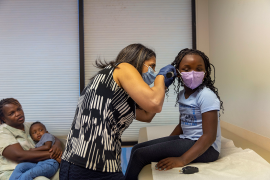Legal immigrants should find it easier to get public health insurance coverage in New York in the wake of recent state court decisions and executive and legislative actions, according to Health Coverage for Immigrants in New York: An Update on Policy Developments and Next Steps.
The study, by Deborah Bachrach and Karen Lipson of Kalkines, Arky, Zall & Bernstein LLP, examines the ways in which federal welfare reform limited legal immigrants access to Medicaid and how a New York State Court of Appeals decision provides coverage for those previously denied. The report also examines how the state is implementing the court decision and addresses other issues, including states need for federal financial assistance to help provide health coverage to legal immigrants on the same basis as citizens. The authors also consider the national implications of the federal governments retreat from sup-porting Medicaid coverage for immigrants.
Until 1997, legal immigrants in New York State had access to all of the same Medicaid benefits as U.S. citizens. An overhaul of the federal welfare system sharply restricted this coverage, and most legal immigrants who entered the U.S. after August 22, 1996, were excluded from Medicaid coverage for their first five years of residency. A state court of appeals decision in June 2001, however, re-stored full Medicaid eligibility to New Yorks legal immigrants who were eligible for Medicaid coverage before the state implemented federal welfare reform and who meet program income guidelines.
New York has also extended coverage to legal immigrants under Family Health Plus (FHP), its new insurance program for low-income adults. These changes, which affect people who have lived in the U.S. for less than five years and those classified as permanently residing under color of law, could collectively benefit about 200,000 residents.
Recent policy changes help ensure that low-income, legal immigrants in New York once again have the opportunity to participate fully in the states Medicaid and FHP programs. The authors stress that one significant gap remains for the states health care programs for low-income immigrants: undocumented adults are still ineligible for any benefits other than prenatal, postpartum, and emergency care. With effective outreach and enrollment efforts, however, legal immigrants will have access to primary and preventive care, their providers will no longer have to provide as much uncompensated care, and public health will be served through increased screenings and treatment for disease.
Facts and Figures
- A March 2001 Commonwealth Fund report estimated that approximately 1.1 million non-citizens in New York State were uninsured.
- By 2003, the number of lawfully present, non-citizen adults with incomes below Medicaid or FHP limits will exceed 238,000.
- At least 10 states, including California, Connecticut, Massachusetts, New Jersey, and New York offer comprehensive, government-funded health coverage to legal immigrants otherwise ineligible for federal Medicaid.


